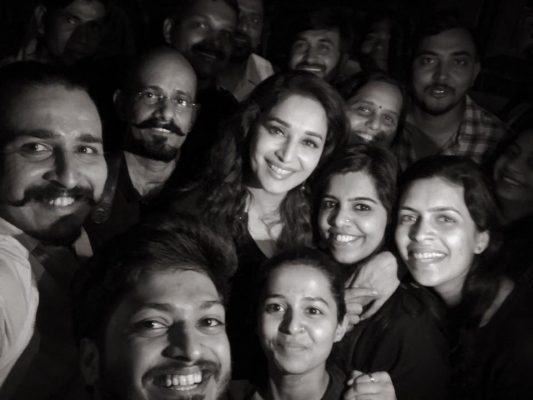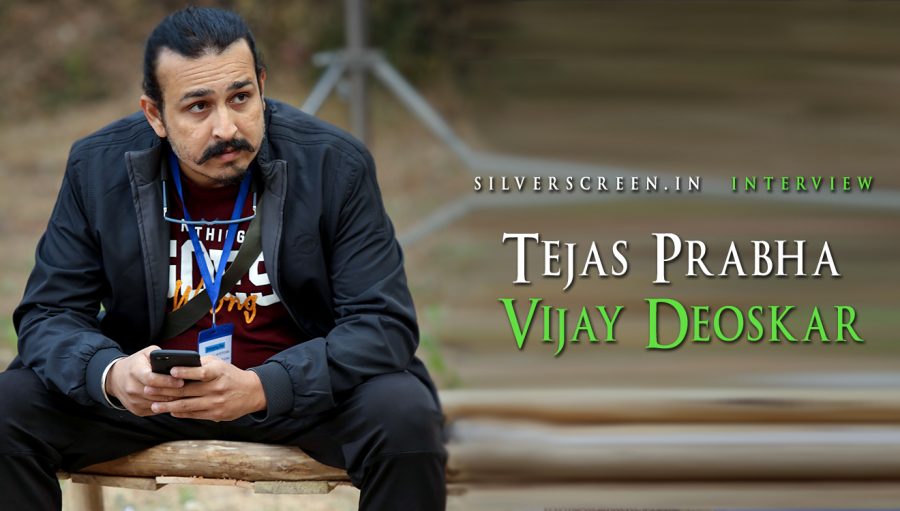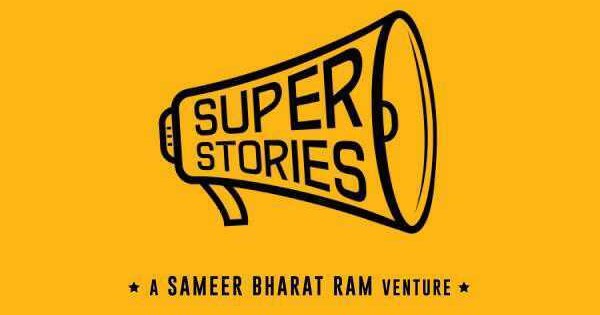When Marathi filmmaker Tejas Prabha Vijay Deoskar had a germ of an idea inspired by a small but significant event in the news, he never knew that it would take him as far as making a movie which would feature a star he’d long admired.
Tejas couldn’t be happier that Madhuri Dixit Nene – a childhood icon of his – chose his film to make her Marathi debut.
In Bucket List, Madhuri plays Madhura Sane, who leads a rather uninteresting life as a home-maker. She admits to being content, but, soon enough, something changes. In the teaser, we see her riding a bike, learning how to whistle, wrestling chefs, and drinking tequila smooth.
In a telephonic interview with Silverscreen, Tejas, who’s best known for his work as director and writer of a popular short film – Kalakaar (2006) – and feature films like Ajinkya (2012) and Premsutra (2013), talks about the making of Bucket List, storytelling, and why Madhuri is more than just a superstar.
My education has helped me design better spaces and understand the ergonomics of other things. It has been a roller-coaster of sorts, but I never felt I’d made a mistake. I still don’t understand how I got sucked into this media field. Honestly, I just wanted to learn about media and technology, and when I look back at the various things I’ve done, I owe it to my upbringing and the fact that I was exposed to a variety of literature and was introduced to several stories since my childhood.
My great grandparents, in whatever little time I had spent with them, would tell me interesting stories. Through them, I realised what storytelling can be and should be. When my grandmother told stories, she didn’t have technology or equipment. Now there’s technology and other means. I have always loved reading and listening to stories, and eventually, that has made me tell stories.
Having dabbled in editing, script-writing, directing and sound engineering, which department of filmmaking do you like the best?
The two most important disciplines of filmmaking are storytelling and writing. I love them both. I firmly believe that a director has to be a writer. Only the medium changes between the two, but if you don’t know the craft, then it’s very difficult to write for films.
Bucket List seems like a simple story. How did you come up with it?
The lead is your typical woman-next-door, someone you’d find walking down the road while you watch out from your balcony. A common person in an uncommon situation, and how she evolves over the course of the story. It’s so simple that anyone can identify with it. It’s not larger-than-life, it’s more slice-of-life. A few years back, I read about an event in the news, it was small but significant. After reading that, I thought it would be interesting to write a story on it. While I had the idea at the back of my mind for a while, when the time came, I wrote the story which Madhuri eventually chose to make her debut in Marathi cinema.
So Madhura Sane is based on a real person?
You look around and you’ll find a Madhura Sane everywhere. Who are they? They are common people like us, they lead a common life. My character represents all those people, but we’re all unique in our own way. I try to bring that out in the story.
How did you get Madhuri on board?
It’s a long story. I was working on another subject and for some reason, it wasn’t going the way it should’ve gone. In the midst of it, I met a friend of mine who had just turned producer. He called me up to ask if I have a film for him to produce. I told him that I do, but my ambitions are big. I told him a snippet of the story, and I had a sudden realisation that this idea could work. It motivated me to write further. That’s how I started working on Bucket List. I had Madhuri Dixit in mind. I thought if she doesn’t say ‘yes’ to this project, then I should wait, in the hope that she would agree some other day.
Meanwhile, I met Devashree Shivadekar, my co-writer. She had come from L.A and was looking for work. I told her about the story. She got really excited and approached Vivek Rangachari from DAR Motion Pictures who became one of our producers. Soon enough, we got in touch with Madhuri’s manager and, before anything, we first asked if she’d be interested in a Marathi film. Turned out, she was. We sent a five-page synopsis of the film and they loved it, and within three days, we were standing in front of Madhuri and narrating an idea which was yet to become a story.
What was the first meeting like?
We narrated the story several times to our friends from non-cinema backgrounds so as to prepare for the actual narration. When we met her, the narration went on for 30-45 minutes. After that, there was silence for ten minutes. We were kind of scared then, worried we didn’t make a good impression. She asked for some time, and later at the parking lot, we were mulling over what had happened. Fifteen minutes later, we get a call from her manager telling us that she wants to listen to the script and we were given six weeks to work on it.
Since we had worked on the flow and structure, we only had to work on the real writing part. In those six weeks, we called in different groups and narrated the story to around 70 people who were not from the industry. Five versions and six weeks later, we had it ready. Barring a few things, Madhuri was fine with the way the script had developed. A week later, we got a positive response from her, but she wanted us to work on a few other things. Three days later, she was finally on board.
Did you fight the urge to make the film more commercial, especially with a star like Madhuri in it?
Not at all. What is commercial? People usually think of commercial films as those with item numbers and other elements. With her on board, our film had already become commercial.
Recommended
What was it like working with Madhuri?
Working with her was like a poem. When we started shooting, there was a storm in Mumbai. Two days before the storm hit, the set we had built had gotten drenched. It wasn’t a huge set, but for a Marathi film, building even a small set is a big thing. Ours was intricately designed, too. We were wondering if we should postpone the shoot or move to another location. A day earlier, I had sent Madhuri a message assuring her that we would do our best. I knew we had to start this project because we had been waiting for a long time. Amidst the uncertainties and contemplation, Madhuri sent me a message which read:
“A storm is coming in tomorrow on the first day of shoot. Wishing this team all the best. Let’s make a great product that creates a storm at the box-office. With warm wishes to everyone, Madhuri aka Madhura.”

Credits: Facebook
It gave me more confidence – that she was transforming into the character she was about to play. She turned out to be a delight to work with. She would come to the sets early and would never have complaints till the time we said pack-up. Next to her, I’m actually a novice, but she gave me a freehand. She came prepared everyday, and that holds for the rest of the crew too. There was no shouting and screaming or people arguing on sets. We faced other difficulties, too, but we stormed through it. In fact, our drone camera broke when we were shooting a song in Langkawi. But now when you look at the song, you wouldn’t realise that it was made despite us losing one entire precious, expensive day – it’s a big deal for Marathi films. And she stood by us throughout.
Upcoming projects?
Next project is under Blue Mustang Creations, which I head; my promoters are Ashok and Aarti Subhedar. In fact, they are the ones who incubated Bucket List, too.
Bucket List, produced by Dark Horse Cinemas, DAR Motion Pictures, Blue Mustang Creations, and Dharma Productions, is scheduled to release on May 25.
*****
The Tejas Prabha Vijay Deoskar interview is Silverscreen exclusive.



